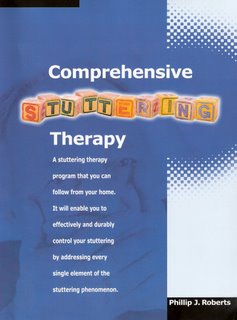
I am reviewing Phillip Roberts' Comprehensive Stuttering Therapy. His success at achieving lasting fluency compelled him to write this book in order to help other stutterers. He is very successful at providing a wealth of useful advice to the person who stutters and wants to achieve greater fluency. And most pleasantly, at the right pitch. He shares his views, experiences, and advice but never in a dogmatic way: "This book should be of great help to most stutterers but I cannot guarantee it will work for everyone. There is a slim possibility that ... you might not notice any improvements. If such ... don't give up. You can consult a speech pathologist or search the Internet... If there is a will there is a way." He does not promise an instant cure without hard work: "This book should allow you to improve your fluency and eventually totally eliminate stuttering from your life. You were probably dreaming of a therapy that would enable you to control stuttering in just a few days and might somewhat disappointed to read that it will a longer period of time...". And, he understands the greatest threat to a lasting improvement: "Achieving fluency is a daunting task but maintaining fluency is not easy either... it is very likely that you will relapse sooner or later."
His work is divided into three parts: theoretical descriptions of stuttering, therapy for adults and teenagers, and therapy for children. By far, the biggest part consists of advice to adult stutterers. He proposes a set of 30 exercises focusing on two different areas Valsalva Control, and Changing Your Behaviors, Perceptions, and Feelings. I wholeheartedly agree with the exercises in the second section, but I still remain to be convinced about his emphasis of the Valsalva control, but to be fair, I haven't tried. I will discuss it in a future post.
So is his approach superior to others? You might as well ask whether this diet better is than that diet, and the answer is: Every diet works if you do what they say. This is the crucial point of his approach, too. You need to be highly motivated, focused, and patient. You need to have an obsessive drive to change your outlook and your behaviour; and not fear challenges. I feel that he could do more to cover this most crucial aspect. Sure, there is no secret potion to generate motivation, but he might have addressed tools like auto-suggestion. For example, he could have suggested sentences the reader should read aloud every evening or morning.
Another weak point is his theoretical descriptions. He did a good job in showing how our feelings and behaviours are linked. He exclusively deals with the symptoms of PDS, and how they reinforce the severity of stuttering. But he completely and utterly ignores the scientific research into PDS. I think his book will be of greater value if he adds one or two sections to inform the reader of the nature and origin of stuttering. Things like % of population that stutters, skewed sex ratio, genetics, 80% of kid recover. Sure, our understanding is not perfect, but to put PDS in perspective.
I want to conclude my review with a quotation from his book: "He sent a copy... to his parents, and they wrote back: This is the kind of book we wish we had read years ago when you started stuttering. During all those years, stuttering was a total mystery to us". I wish I had read his book during my teenage years for dealing with my stutter: advice for treatment and a positive attitude. But his book would have done nothing to inform me about the nature of stuttering. And PDS is still a mystery to me.
2 comments:
Hum, looks interesting, I might order it... Have you read "self-therapy for the stutterer" (by Malcolm Fraser)? It's an old self-help classic, contains a lot of usefull elements, old but proven. It's the only other "self-therapy book" regarding stuttering I know, do you know any others?
Hum, "Every diet works if you do what they say"... well, no, it also depends on the quality of the diet first of all... And just as with diets there are a lot of reasonable and less-reasonable stuttering therapy concepts, and it's hard for a stutterer to evalute what's effective and what's not... And as long as there are few reliable stuttering research results available on the various therapies, unfortunately the best thing for a stutterer to do is trial and error I guess...
Ups, sorry for the deleted comments above, but the url wouldn't appear right... anyway...
Einar a dit…
Btw, the 5th edition of Malcolm Fraser's Selftherapy for the Stutterer is also available for free on the internet:
www.mnsu.edu/comdis/kuster/
TherapyWWW/selftherapy.html
Post a Comment